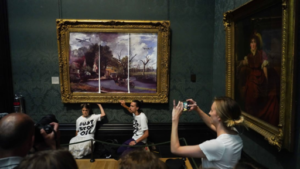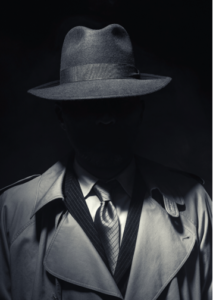The Difference Between a Democracy and a Republic
There’s a lot of talk about “losing our democracy.” From the left and the right. But did you know that our country was established as a republic, a democratic republic and not a direct democracy? That’s an important difference, one that is at the center of some recent Supreme Court decisions. Click here.
Performance Art or Wanton Destruction of Property?

On Monday, July 4, two people from a group calling itself Just Stop Oil went into the National Gallery in London and glued themselves to the frame of John Constable’s The Hay Wain. They also covered the painting with a modified version, showing the same bucolic landscape but with planes passing over a sullied sky. According to CNN, this was the third such “protest” engaged in by the group in recent weeks. “New fossil fuels are a death project by our government,” one of them said. “So yes there is glue on the frame of this painting, but there is blood on the hands of our government.”
“Facts matter not at all. Perception is everything.” – Stephen Colbert
A palliative – from the Latin for “to cloak” – is something that serves to soothe or alleviate pain. As I used it today: “I spent several hours on a strategy for managing my now-reduced cash flow – a Plan A, a Plan B, and a Plan C (optimistic, realistic, and worst-case). This, I knew, was necessary not just for practical reasons, but also as a psychological palliative for my recent misfortunes.”
Why I keep doing what I do:
“I’ve been a fan of your books for some time now…. I owe my success in financial copywriting [to what] you gave in your books (Great Leads, Copy Logic, etc.) many years ago.” – TY
Re what I said about Carole King in the May 13 P.S.:
“You really thought her fame was based on her Friends??? And the two guys you mentioned makes me wonder if you are speaking of Carly Simon?” – SH
“Carole King and her husband Gerry Goffin were a hit machine at the Brill Building. She’s not a celebrity; she’s one of America’s best-loved popular songwriters.” – VS
“Did you see the Carole King play? I knew she wrote many songs but I was surprise by how many, how good they were, and who sang them.” – AS
My response: I did have that idea – that her fame was at least partly dependent on the bigger artists she hung with. My point was that until I saw the video I posted, I underestimated her talent and appeal. For example, I remember seeing her do a song with James Taylor, whom I’ve always been very high on. And I thought she was tight with Mick Jagger. But the reader is right. I may indeed have thought that it was she, not Carly Simon, who wrote You’re So Vain. I remember also not particularly liking any of her songs, which may have been the cause of my bias against her. But seeing that video helped me understand that I was both ignorant and wrong.
Re what I’ve been saying about conceptual art:
“Seeing all conceptual art as fraud is quite a broad stroke… there is much – as in all forms of art – that has validity, and plenty that doesn’t appeal to the masses.” – SH
My response: Yes, quite the broad stroke. And yet, I will make that statement again. Because I’ve yet to see an example of conceptual art that strikes me as anything but conceptually (i.e., intellectually) pretentious. My feeling about art is that pretentious art is, prima facie, bad art. And that plastic artists specifically should avoid dealing with ideas because they are generally ill equipped to distinguish good ones from bad ones.
The latest from The Innocence Project…
When I was 17, I spent a week in a jail cell in Victorville, CA. It wasn’t pleasant. The cell was small. The meals were bad and skimpy. The treatment was denigrating. But the worst part was knowing that I could not leave. I promised myself that I would remember how that felt. And I did. And I remembered what I told myself then: Whatever it takes, don’t go back!
It seeded in my gut a respect for the serious punishment that incarceration is. And, more importantly, the awareness that putting an innocent person in jail is a terrible injustice, one that should not be taken lightly. As a result, I’ve always been inclined to support efforts to free unfairly imprisoned people. Thus, my ongoing support for The Innocence Project and similar non-profit programs.
Click here to learn about a man that was unjustly imprisoned for 27 years and is now working to keep others from having the same experience.
In Search of Meaning… Redux
Part I: A Bad Start to a Summer Cruise

A friend said I was victimized. I don’t see it that way.
The outbound flight that was to take us directly to Athens to begin our three-week European vacation was delayed by six hours, which meant we were routed through Amsterdam and Paris and arrived numb and tired, too late for the scheduled departure of our cruise. Our travel companions had already left. We would catch up with them at the next port a day later.
Okay. Fine. No problem.
We checked into the nice little boutique hotel we had been registered to stay at the night before. They had a room. And they were very welcoming. In fact, their welcome was so warm and inviting that I didn’t notice that one of my two bags, a Bottega-Veneta Intrecciato, which was sleeved onto the extended handle of my Tumi carry-on, was deftly stolen as it stood, with our combined luggage, just beside and behind us.
Nobody noticed it. Not I. Not K. Not the hotel manager or the desk clerk. In fact, when I turned around and announced, in shock, that my bag was gone, they all agreed that I must have left it in the taxi.
“No. I’m certain it was there, on top of my carry-on,” I said, feeling increasingly alarmed and frustrated at being doubted. “It must have been stolen!”
They again assured me that I was mistaken. And since my track record of being right about remembered events is getting worse with each passing year, I had a flickering hope that perhaps I was wrong. Perhaps it was still safely in the taxi. As it happened, the taxi driver had given me his card when he dropped us off. I called. He took a look. No, it wasn’t there, he said. He also said that he remembered seeing me put the one bag on top of the other.
Meanwhile, the hotel manager, who, to her credit, was greatly disturbed by the thought of her guest being robbed inside her reception, went back to the office and reviewed the security camera footage.
Unhappily for me, I was right this time. It showed us walking in and setting down our luggage. Then a man walking in at a quick but unhurried pace, his head tilted down, taking the bag, and walking out while we were chatting happily with the greeting committee. He was very calm. Very efficient. He was in and out in less than 15 seconds.
It was, as I suggested, a rather expensive bag. And it was one of my favorites. Soft, lightweight leather. Just the right size for my business and personal effects. With zippered and buckled pockets.
Inside was a Goyard cigar case, a box of Padron Aniversario Churchill cigars, my Apple Air laptop, a backup laptop (in case something happened to the first one), a Ralph Lauren Dopp kit, a special case I had made to hold my supplements, two pairs of custom-made eyeglasses, several designer bracelets, and a paper envelope containing a substantial amount in euros.
The worst of it was the loss of the laptops. The lion’s share of my life’s work happens on a keyboard. Being without one, even for a day, is difficult. It’s nearly impossible to do any serious work on a cellphone, hunting and pecking out sentences with an index finger. I would try, but until I got a replacement laptop, which I was told would take at least a week to be delivered, I would be falling behind on my work with each passing day. Stressful.
I went to the tourist police, as recommended, and filled out a report. It was a dreary office, sparsely furnished. Fluorescent lights that flickered and buzzed. The young man that took my information was attentive and sympathetic. He worked on a manual typewriter. The report was several pages long.
While he was typing, it occurred to me to check my iPhone’s “Find My” application. Sure enough, there was a location identified for one of my laptops.
“I know where they are!” I told the officer. I showed him my phone.
He looked at his wristwatch. “But they were taken an hour ago,” he said, sighing.
“And?”
“That’s a bad neighborhood. They aren’t there anymore. The man that took your bag, he’s a pro. The computers have been deactivated by now. They’re probably in a pawn shop in some other part of the city. The bag, the cigar case, and the rest of it, too. Each in a different location. That’s how they do it.”
“And the cash?”
He smiled sheepishly. “Oh, that’s in his pocket. But who knows where he is?”
I went back to the hotel, out of hope and empty-handed, and spent the next several hours chastising myself for letting our luggage out of my sight and especially for putting my laptop, and its backup, in the same bag.
K reminded me that everything I lost could be replaced.
“Except my self-respect,” I said.
“That will come back, too,” she assured me.
I used my phone to check my email. And there, in the inbox, was a message from one of my partners. A message I was hoping I wouldn’t be getting. In response to a crumbling global economy and the resulting collapse of the stock market, he and my other partners had decided to reduce the compensation we were taking from our largest business. Did I want to do the same?
I couldn’t say no. Starting almost immediately, and until things got better, that very significant stream of income would be reduced to a trickle.
Strike one: Bag and contents stolen.
Strike two: Loss of my largest source of income.
I was a 6 on my 1-10 mood scale after the theft. Now I was down to a 5. Maybe a bit lower. I opened my carry-on to fetch my antidepressants. They weren’t there. I had left them in the other bag, the one that was stolen.
The thought of spending the next two weeks on a sailboat trying to be on vacation seemed like an impossibility. I wanted to book the next flight back to Florida. But that would mean disappointing K and our friends. It was not an option. I had to get my mind straight. So long as things didn’t get worse, I would find a way.
But things got worse.
More to come…
The Unnerving Idea of “Total War” With Russia and China

I’ve been doing business in Russia and China for more than 40 years. During that time, I’ve had nothing but good to very good business experiences. I’ve also had nothing but good experiences with the Russians and Chinese I’ve met and worked with over that time.
As a result, I’ve never been able to see those countries as existential threats to the US. Nor can I generate any animosity toward or fear of Russian and Chinese people. I don’t feel like I’m being naïve. I recognize that our governments are competitive. And that China’s economy is nearly as large as ours and growing more quickly. I see Russia’s invasion of Ukraine as a response to Putin’s fear of having another NATO ally on their border. But I also believe the invasion is an act of war that must, in some way, be opposed.
I also see this development as a predictable outcome of the Cold War that never really ended. In fact, it has been predicted and planned for by US and Russian military strategists for decades. There is this concept called “total war” that is part of that planning. If you haven’t heard of it, you may find it alarming. Click here to watch an expert talking about it.

Bureaucratic business regulations are not just a nuisance, but a considerable cost to businesses. They reduce productivity and make financial objectives more difficult to accomplish. Undoubtedly, some regulation is necessary to limit bad business practices. The challenge is always to outlaw the bad things without curtailing the good ones.
It’s bad in the US. But it’s even worse in the European Union. (I know. My partners and I have businesses in England, France, Germany, and Spain.) In addition to the umpteen regulations negatively impacting the production of goods and services, the EU has created hundreds of rules meant to “protect” employees from every imaginable form of workplace abuse.
Click here to read about one of them.

I’ve mentioned this before. In recent years, I’ve become increasingly skeptical of the claims made about electric cars and trucks. They were introduced as a major weapon in the war against global climate change. They were sold as eco-friendly because they don’t emit CO2, a key factor in the disintegration of the ozone layer.
But the surprising fact is: They do. In fact, when the math is done correctly, their production of CO2 is actually greater than gas-powered cars. As Graham Conway explains in this TED Talk, electric cars will likely play an important role in the future. But as things stand today, they are not what most people believe them to be. Click here.

It’s good to know, I think, that there are computer geniuses out there hacking into and F-ing up telephone scammers that prey on trusting old folks like me. Many of these operations are headquartered in India. (No surprise there.) One such avenger is the very entertaining young man in this video. Click here.
As I said, this should be good to know. But it made me feel uneasy realizing how this guy, if he became evil, could be doing amazing scams himself.
Thoughts on Learning Italian
Italian is a fourth language for me. But of the four, it is in one way my favorite. Italian has a tempo and openness to it that is much greater than English and equal to French and Spanish. On top of that, it has a musicality that is uniquely charming. And that is why, when I’m in Italy, I make an effort to speak it.
I bring a pocket-sized grammar with me, and work from that. But this time, due to an unhappy circumstance (see “Notes From My Journal,” above), I was without one. So, I bought a phrase book, the only one I could find. It was Italian for French speakers.
That wasn’t a huge problem. The level of my Italian is basic, but my French is pretty strong. And so, I used it. And received a surprising bonus for doing so. I discovered that, contrary to what I had always assumed, Italian is much closer to French than it is to Spanish.
Italian and French and Spanish are all descendants of Latin. And all share many of the same linguistic aspects, such as genderized nouns and pronouns. But French is much, much closer to Italian than Spanish is in terms of vocabulary and grammar. So, from now on, when I am wanting to say something in Italian, instead of thinking first, “How would I say this in Spanish?” I’ll think, “How would I say this in French?”
I recognize this is probably more exciting to me than it is to you. But if you happen to speak French, and struggle with Italian, this is cause for celebration.
